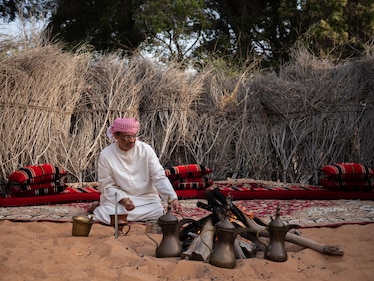Gahwa: A quintessential symbol of Emirati hospitality
Coffee and a warm welcome are synonymous in Abu Dhabi and the wider UAE.
Photograph by Nicole Sobecki

Please be respectful of copyright. Unauthorized use is prohibited.
An age-old Emirati welcome
The scent of coffee—or gahwa as it is known in the UAE—infused with flavors like cardamom and rose water is one that is deeply associated with Abu Dhabi and the warm welcome you will receive in the emirate. Coffee culture is an important display of hospitality in Emirati society, hailing from the days when Bedouins relied on reciprocal generosity. It is so deeply ingrained in local life that serving it comes with its own set of rituals and etiquette. At Heritage Village in Abu Dhabi, visitors can experience the traditional coffee-making process.
Photograph by Nichole Sobecki
Please be respectful of copyright. Unauthorized use is prohibited.
A coffee pot brimming with scents and flavours
Once the coffee beans are roasted, they are placed inside a dallah—the traditional Arabic coffee pot—and boiled. At this stage, an array of spices and flavorings are added to enhance the taste, such as cardamom, cloves, and saffron. This creates a distinctive, sweet scent, one that you will find permeating the air in majlis—sitting places where members of the community can discuss ideas—homes, coffee shops, and many hotel lobbies across the emirate. Abu Dhabi’s markets house a wide array of colorful, flavor-packed spices that are used in gahwa as well as deeply loved local dishes such as ayesh muhamar and machboos.
Photograph by Nichole Sobecki
Please be respectful of copyright. Unauthorized use is prohibited.
The perfect coffee partner
Traditionally, gahwa is paired with dates, a firm staple in Emirati cuisine. The date palm tree has great importance in local culture due to its resilience and ability to grow well in oases that exist throughout the region. Because of this, dates have aided in the development of civilizations in the desert, leading to an enduring relationship between the Arab region and the date palm tree. The Liwa Date Festival, an annual event held in Abu Dhabi during which date producers have a chance to exchange ideas and knowledge on production, is one way in which the tree is celebrated to this day.
Photograph by Nichole Sobecki
Please be respectful of copyright. Unauthorized use is prohibited.
A date for everyone
One can grasp the sheer variety of dates found across the Middle East when they enter a traditional market, like the Al Mina Fruit and Vegetable Souk in Abu Dhabi. There you’ll find dates that come in many shapes and sizes, with popular varieties including the medjool, fard, khalas, and barhi. Medjool dates, for example, are large, plump, and syrupy, while barhi are sweet and soft. They are also available in different forms, from plain to stuffed with pistachios and orange peel or even covered in chocolate—something for everyone.
Photograph by Nichole Sobecki
Please be respectful of copyright. Unauthorized use is prohibited.
Roasting, modernized
Making traditional gahwa in Abu Dhabi is an elaborate affair with many steps, from roasting to grinding the beans, and adding spices. While the traditional coffee ceremony is maintained across the emirate in some form or another to this day, specialty coffee shops are now found across Abu Dhabi. Roasters such as Blacksmith Coffee Company are sourcing coffee from around the world while staying true to their local roots. While roasting was traditionally done over an open fire, today it is mostly completed using machines like the one pictured here.
Photograph by Nichole Sobecki
Please be respectful of copyright. Unauthorized use is prohibited.
The best in quality control
The quality of a batch of coffee can be tested using the cupping tasting technique (pictured here), which checks for cleanliness, sweetness, acidity, mouthfeel, and aftertaste. Quality measures such as cupping help to check the quality of locally produced roasts, ensuring that coffee in the UAE can compete with the best globally.
Photograph by Nicole Sobecki
Please be respectful of copyright. Unauthorized use is prohibited.
Traditional gahwa in a modern setting
In the UAE, welcoming guests and gahwa come hand in hand. The serving of coffee is seen as an act of generosity, and the elaborate process is traditionally integral to the majlis. Today, this time-honored tradition of coffee and hospitality is being translated through modern coffee shops in Abu Dhabi. Nooran Al Bannay (pictured here) left a senior engineer position with a major oil company to open Coffee Architecture, a coffee shop that celebrates UAE gahwa culture. Nooran’s story is a great example of Emiratis wanting to preserve local coffee traditions by bringing them into the modern age.
Photograph by Nicole Sobecki
Please be respectful of copyright. Unauthorized use is prohibited.
A warm message
An aromatic cup of gahwa is always available for guests at Coffee Architecture. This heartfelt handwritten message from Nooran to her customers demonstrates how traditions from the past—such as prized family gahwa recipes—can be passed down to future generations. In this way, hospitality, a value deeply enshrined in Emirati culture, is extended to others and preserved.
Photograph by Nicole Sobecki
Please be respectful of copyright. Unauthorized use is prohibited.
Gahwa in the 21st century
Modern technology enables Nooran to share Abu Dhabi’s coffee culture and her extensive knowledge beyond her coffee shop’s doors. The entrepreneur regularly hosts Instagram Live sessions to extend an invitation to viewers abroad to come and experience Emirati coffee culture for themselves.
Photograph by Nicole Sobecki